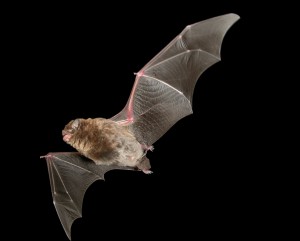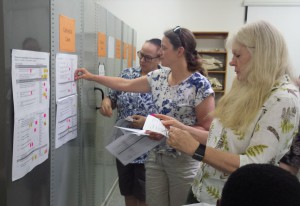Southern Bent-wing Bat Regional Action Plan and workshop
Our region is home to a very special critically endangered animal, one which you may not be familiar with – the Southern Bent-wing Bat. This small insect-eating bat roosts in caves all around the South East and western Victoria.
A rapid and sharp decline in the population of Southern Bent-wing Bats at Naracoorte has occurred since the 1960s, triggering research that aims to determine the reasons for the decline, and how we can halt and reverse this process.
Over the past couple of months I have been working on an review and update of the Regional Action Plan for the Southern Bent-wing Bat which will help shap management of the species for the next ten years. As part of the RAP process, I recently held a workshop in Naracoorte inviting bat experts and other stakeholders to contribute their expertise. At the workshop we discussed actions which have taken place since the previous RAP (2009), remaining knowledge gaps, and desired actions for the future. Working from the National Recovery Plan for the Southern Bent-wing Bat we prioritised the most pressing actions in a fun activity which our facilitator, Nat Misic, named Dot Democracy.
The next steps of the process involve distributing a draft Regional Action Plan to workshop participants and other interested parties and incorporating their feedback into the final version. We are aiming to ensure the new RAP contains specific and achievable actions which will help ensure this species’ survival into the future.
Although they are usually out of sight, out of mind for many people, bats, including the Southern Bent-wing Bat, are a hugely important part of our ecosystem. Did you know 16 species of bats have been recorded in the South East? Most of these are insectivorous species, and may eat up to half their body weight each night of a variety of insects, including agricultural pests. Additionally, recent research has shown that these tiny bats can travel vast distances quickly – up to 70 km in just 5 hours!
As bats are nocturnal if you see one during the day it may be unwell and/or injured. If you come across a bat you think might need help, please report it to Natural Resources South East (08 8738 1177). While the risk of injury is very very small, it is important that only experienced individuals handle bats. Remember: no touch, no risk!
The Regional Action Plan is part of the Restoring Under-represented Ecological Communities project delivered by NGT, thanks to the support of NRSE and the Australian Government. Thank you to Nat Misic (NRSE) for keeping us on track at the workshop, and all workshop participants for your input.


